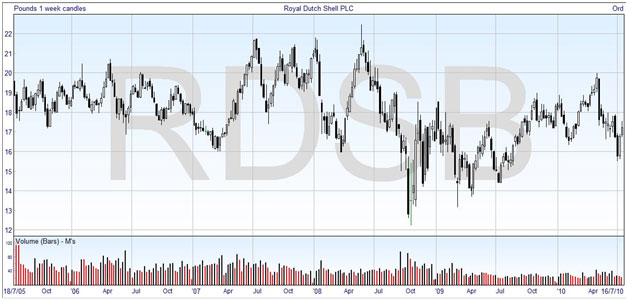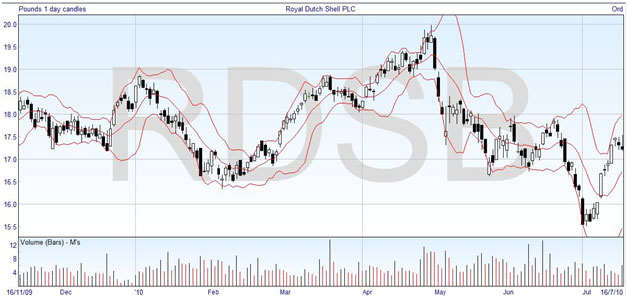Spread Betting Royal Dutch Shell
Royal Dutch Shell plc (RDSB), better known simply as Shell, is as most people know an oil and gas company, and a major player in the energy business. It is the fifth largest company in the world, and the second largest energy company, according to Forbes magazine. It is also the largest company listed on the London Stock Exchange with a £138 billion market cap. As such, it is active in all areas, all the way from exploration and production, through refining and distribution, and including power generation and trading. It has also taken on renewable energy interests, including bio fuels, solar power, wind power, and hydrogen fuel.
The Royal Dutch Shell group was formed more than a century ago, and made up of Royal Dutch Petroleum, a Dutch company, and “Shell” Transport and Trading Company in the UK. It is said that “Shell” takes its name from the father of the founders who had a company importing and selling seashells. Both of these companies were founded in the late 19th century. Royal Dutch Shell plc, the current company, was created in 2005 to unite the whole group. This came into being because of some problems in 2004 when it was found that Shell had overstated its reserves.
The company is split into three or four groups – Upstream, Downstream, and Corporate, with the Upstream further split into the American group and the International (other) part. Upstream does everything in the exploring side, including recovering oil from oil sands, one of the most recent technologies to be used commercially. As it is on the production side, it also handles alternative technologies like wind power.
Downstream, as the name suggests, is concerned with manufacturing and distribution of oil and other products and chemicals. Corporate, also called Products and Technology, takes the overall support position, taking care of the money side, administration, and self-insurance. The £137 billion cap is presently performing well with three of its biggest developments – the Pearl Gas-to-Liquids (GTL) plant and Qatargas 4 liquefied natural gas (LNG) hub in Qatar and its Canadian oil sands project running strong.
Royal Dutch Shell is therefore a solid company with defensive qualities, one that many people have invested in for their retirement savings, and overall enjoys an exceptional dividend track record while offering investors a hedge against further energy price hikes. In fact the company hasn’t cut its dividend payout since 1945 and offers investors a prospective yield of 5.4%, based on 2013’s analysts consensus dividend per share forecast of 119p.
Of course this doesn’t mean that the company doesn’t carry risks. There have been issues with management, such as the misreporting of reserves discovered in 2004 while Royal Dutch recently had to make a $2.1 billion writedown on its North American shale assets as the company experienced disappointing output from these fields. The company also had to abandon its 2012 exploration ambitions in the Arctic because of safety issues. A further bone of contention was the formation of Royal Dutch Shell plc which the management decided would be apportioned in the same way as the originally formed company, with 60% to Holland and 40% to the UK, and most recently there have been issues with the Annual General Meeting being held only in Holland, making the UK side feel like second-class shareholders. Having said this the Anglo-Dutch giant is still in line to develop 20 new resource projects over the next two years and this should provide ample room for further growth.
For the spread better, as with all companies in the energy industry there are certain items of news that can affect the share price, and it is quite possible to trade the news. Some news will be to do with all energy usage, including alternative energy sources which may vary in the amount of subsidy and popularity they enjoy from time to time, and some will be specific to Royal Dutch Shell and its technology and exploration. If you’re tempted to anticipate price movements on this basis, make sure that you have a sound stop loss strategy to protect your capital.
Trading Royal Dutch Shell: Spread Bet on Shell
Royal Dutch Shell has been around in some form for over one hundred years, and is now the world’s largest private oil company, when you consider revenue. In fact, the company has generated in excess of $12.5 billion in free cash flow over the first half of the 2012 year. It has stuck fairly well to its original purposes, exploring, producing, refining and transporting, although there have been efforts to diversify into other areas. The company hasn’t, however, started the year 2012 on a positive note having announced disappointing fourth-quarter results which led to earning downgrades by analysts.
 |
On this long term weekly chart of Royal Dutch Shell, you can see a lot of price action, and this is what makes it important to the spread betting trader. The chart shows a nearly two to one ratio between highest and lowest prices, because of the economic crash, but if you look elsewhere you can see that even normal volatility has embraced significant swings of nearly 50%.
Shell has traditionally been a widespread operation, headquartered in Holland and registered in London, and operating in 140 countries. The latest corporate manoeuvre was to create a single structure called Royal Dutch Shell plc in 2005, in some ways responding to pressure following the revelation that oil reserves had been consistently overstated, but the changed structure has not made much difference to the core operations.
Other interests that Shell has pursued include nuclear power, coal, mining, and electricity generation, but none of these has had much impact on the traditional focus. The only sector outside of oil which seems to figure consistently in the Royal Dutch Shell company is the closely allied natural gas area, and in 2010 it spent nearly $5 billion to acquire an American natural gas exploration company.
 |
The daily chart for Royal Dutch Shell echoes the large swings that we saw on the weekly, and the frequent gaps and candlestick signals make this an intriguing share to anticipate. The next news generated price events are likely to be involved with the carbon trading movement, which continues to build strength and needs to be globally addressed. The UK and Europe seem to be better geared to the reduction in carbon emissions than does the United States, which provides more than its share of pollution and is still debating cap-and-trade measures.
From a trading perspective, the basic simplicity of the company model, focusing on energy from oil and gas, means that the reaction to news is at least more predictable than with corporations that have involvement in many varied sectors.
You can see on the one day chart that the price is fairly rational, following the Bollinger Bands closely and providing clear signals of a crossover in trend when it breaks the centreline, even when it is countertrend and does not last for long. This allows alert traders to anticipate the direction changes and to know when to get out of the stock. If the price is tracking down along the lower Band, then it is reasonable to hold a short position until the price crosses up through the centreline, and vice-versa. Towards the end of June, for instance, the short signal would be at just over £17, and the trader would exit either on a trailing stop or when the centreline was crossed upward, at £16.20, for about a 5% gain in just over a week.
Trading Royal Dutch Shell
Royal Dutch Shell plc is an enormous company, with resources in many countries, although its main share listing is on the London Stock Exchange. You will see that there are both “A” and “B” shares, and Shell asserts that these are equal in all respects except one – A shares are based in Holland for dividend payouts and subject to Dutch taxes, B shares are based in the UK, and dividends come under the English rules for taxation. The current spread betting quote for B shares on a rolling daily basis is 2330.2 – 2335.8. Shares are always quoted in pence, so this means to buy a share would cost you £23.30+ each.
If you think that the shares will increase in value, you would want to place a long bet say for £8 per point. The buying price is 2335.8, so you’re looking for an increase above this number. Say the price rose and you decided to close the bet when it was quoted at 2392.6 – 2398.2. As long as you know the correct price to use, it is easy to calculate how much you have won.
- You opened your spreadbet at 2335.8
- You closed your spreadbet at 2392.6, the selling price
- Therefore you gained 2392.6-2335.8
- This works out to 56.8 points
- At £8 per point, you have won £454.40
Whenever you place a spread bet, you must be open to the possibility that it will lose, and be prepared to close your bet quickly to minimize your losses. Say the price dropped to 2319.6 – 2325.2, and you closed your bet and accepted your losses.
- You opened your bet at 2335.8
- You closed your bet at 2319.6, the selling price
- Therefore you lost 2335.8-2319.6
- This works out to 16.2 points
- At £8 per point, you have lost £129.60
The price for a daily rolling bet on A shares is quoted at 2299.2 – 2304.8. As you can see, the spread, the difference between the two prices, is the same as with the B shares, and you would expect these prices to broadly follow the same fluctuations as B shares. Considering a short betting position, suppose you think the price is going down and you stake £12 per point on this A quote. The bet would go on at the selling price of 2299.2.
If you are correct, and the price drops to 2221.9 – 2227.4, you could close your bet and take your profit. Just as in the example above, the calculation is simple: –
- Your short spread bet was placed at 2299.2
- It closed at 2227.4, the buying price
- Therefore you have gained 2299.2-2227.4 points
- That works out to 71.8 points
- For your stake of £12 per point, this equals £861.60
Once again, your bet might have been a losing one, and you can close it to cut your losses when the quote rises to 2315.1 – 2320.6.
- Your short bet was placed at 2299.2
- It closed at 2320.6, the buying price
- Therefore you have lost 2320.6-2299.2 points
- That works out to 21.4 points
- For your stake of £12 per point, this equals £256.80


Join the discussion